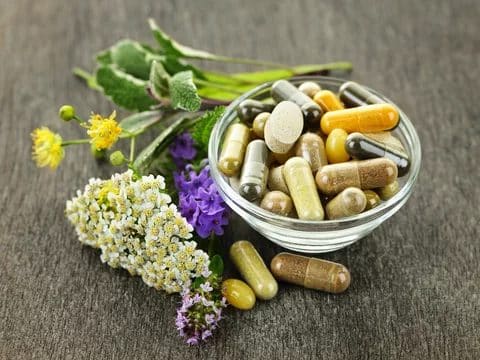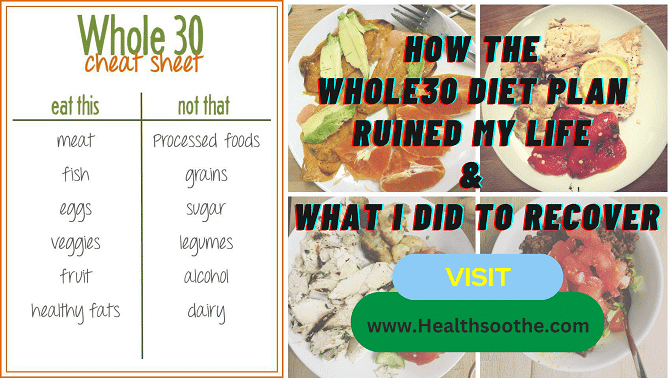While over-the-counter products like cough syrups and pain-killers come in handy when you're sick — considering they usually reduce discomfort you might be feeling — they won't necessarily help to speed up the recovery process. However, there are plenty of healthy foods and supplements you can take that can assist you in healing and feeling better sooner when you're sick.
When your body is working on bouncing back after battling an illness — whether it's due to a short-term cold, the flu, a stomach virus, respiratory infection, or something more chronic — you'll benefit from consuming the right type of "fuel" that powers your immune system. This fuel comes in the form of certain vitamins, minerals, antioxidants, amino acids, and fatty acids.
How can you obtain the nutrients your body needs to assist in your recovery? The best way is to emphasize nutrient-rich foods in your diet, such as dark leafy greens, citrus fruits and berries, probiotic foods like yogurt, and real bone broth, among others.
Supplements can also come in handy by helping to fill in gaps in your diet and by boosting levels of key vitamins that are needed to boost your immune defenses, such as vitamin C and zinc.
How Foods and Supplements Support Our Immune Systems
Your gut (also called your microbiome) is basically ground zero when it comes to battling illnesses. Did you know that more than 70% of your immune system is located inside your gut?
That's why it's essential to consume plenty of gut-friendly foods, such as those that provide you with probiotic bacteria and nutrients, including protein and antioxidants that support the integrity of your gut lining.
The best type of foods and supplements to focus on when you're not feeling well ultimately depends on the specific illness you have. For example, if you're nauseous and vomiting, the most effective approach is usually to focus on staying hydrated and eating bland foods, first and foremost.
On the other hand, if you have a cold, flu, or a similar virus, you'll want to load up on foods that supply you with nutrients like vitamin C, zinc, and B vitamins, which help to limit fatigue and support detoxification.
The Best Foods, Herbs, and Supplements to Support Recovery
So what should you eat when you're sick to start feeling better as quickly as possible?
Here are some of the best foods and supplements that provide the vitamins, minerals, amino acids, and fatty acids that your body needs to help you get better:
High Antioxidant Foods (such as fruits, vegetables, and herbs/spices)
Antioxidant-rich foods, such as a variety of brightly colored fruits and vegetables, are the perfect foods when you're recovering from an illness. They're also the same types you should emphasize during all other times of life too — considering they help fight free radical damage and oxidative stress, which take a toll on your immune system.
Additionally, another perk of eating fruits and veggies (if your stomach can tolerate them) is that they have a high water content and therefore help prevent dehydration.
Fill up on colorful foods like berries, oranges, red peppers, kale, Brussels sprouts, broccoli, cocoa, sweet potatoes, acai, grapefruit, kiwi, and mango. Not only do these supply you with antioxidants like polyphenols, carotenoids, and anthocyanins that overall defend against tissue damage and cellular damage, but they also tend to be high in electrolytes and vitamin C, which are beneficial if you're vomiting or not eating much.
All types of berries (strawberries, blueberries, blackberries, and raspberries) as well as citrus fruits are among the most nutrient-dense fruits, prized for their supply of nutrients that can support you while you're ill.
Dark leafy greens such as Swiss chard, spinach, kale, and cabbage are also very high in antioxidants, and vitamins A, C, and, K — musts for maintaining healthy circulation, promoting the flow of oxygen-rich blood to your issues, and assisting in gut health, which is where the majority of your immune cells are actually found.
If you're experiencing diarrhea, try baking or boiling baked potatoes, winter squash, baked apples, applesauce, bananas, or pears, which provide you with fiber that can help.
Probiotic/Fermented Foods
Foods that contain probiotics — such as yogurt, kefir, kombucha, sauerkraut, and kimchi — promote a healthy microbial balance in your gut, meaning they boost levels of beneficial bacteria that help to fight pathogens.
Probiotics from your diet (and in supplement form) can also support healthy digestive function and gut integrity, which is important for absorbing the nutrients you consume from other foods, as well as for limiting inflammatory responses.
Teas
When you're sick, it's important to sip on liquids throughout the day in order to prevent dehydration and support detoxification performed by your lymphatic system, liver, and kidneys.
Teas are ideal beverages when you're unwell because they're full of antioxidants, polyphenols, and other health-promoting compounds.
Green tea is especially rich in epigallocatechin gallate (EGCG), a catechin that has been associated with a long list of health benefits including healthy aging. Black tea is loaded with theaflavins, a type of polyphenol that is thought to have certain immune-supporting and antioxidant properties.
Ginger tea and peppermint tea are other great choices because they can reduce nausea and indigestion.
And echinacea herbal tea, long used in traditional herbal systems, has the ability to support healthy immune system function thanks to compounds including caffeic acid and polysaccharides that fight free radical damage and inflammation.
Bone Broth and Fresh Juices
Traditional bone broth, as well as other stocks and soups, are a great way to obtain fluids and electrolytes that assist in hydration. Stocks and broth can also act as natural decongestants when served hot, meaning they help respiratory function.
Fresh juices and smoothies — such as those made with orange, lemon, wheatgrass, tomato, and celery juices — are also recommended when your body is recovering because they are hydrating, full of antioxidants, and usually rich in vitamin A, vitamin C, and potassium. If drinking liquids doesn't sound very appealing, try freezing juices into popsicles (opt for no-sugar-added juices).
If you don't have access to fresh juices, try a powdered green juice mix stirred into cold water, such as one that features a blend of superfoods like spirulina, beetroot juice, and oat grass juice.
100% Whole Grains
Bland foods such as plain whole grains can be a good option when your appetite is lacking or you're experiencing indigestion or nausea. Whole grains such as wheat, barley, oats, and brown rice are usually well-tolerated when you're not feeling well; in fact, they may help reduce diarrhea if this is a concern, although it depends on your specific reaction.
These grains all contain fiber, which can help to support gut health and regulate digestion. Plus they are a good source of B vitamins, iron, zinc, copper, and magnesium, which support healthy circulation and many metabolic functions.
If you're having a hard time eating whole grains on their own, try whole grain pretzels, breads, cereals, or crackers.
High Protein Foods (like eggs, fish, organ meats, and grass-fed meat)
Foods containing protein provide your body with amino acids, the building blocks that help to form and repair tissues that line your gut, as well as those that give structure to your joints, ligaments, and more. A lack of protein in your diet may increase fatigue when you're feeling ill.
Fatty fish such as salmon, sardines, and herring are especially great for keeping your immune system running smoothly because they contain both protein and omega 3s, healthy fatty acids that have anti-inflammatory effects.
Many protein foods such as organ meats, dark poultry meat, and beef are also high in iron and B vitamins, which promote healthy circulation and cognitive and metabolic health, all of which give your body more energy while you're getting better.
And as long as dairy products like yogurt or kefir don't aggravate your stomach, they are great sources of electrolytes, protein, and probiotics.
What About Supplements?
Try incorporating some of these supplements below into your routine, which are among the best for supporting your immune system:
Probiotics
Probiotic capsules are a convenient way to obtain healthy microbes that can promote the production of natural antibodies in the body. They may also boost immune cells like the IgA-producing cells, T lymphocytes, and natural killer cells, all of which defend against pathogens that can make you sick.
New research suggests that probiotics may even help defend against several immune response-related diseases such as allergies and eczema, as well as viral infections. Look for a product that contains at least 25 billion CFUs per serving and strains in the Lactobacillus and Bifidobacterium families.
Zinc
Zinc is an essential co-factor for multiple enzymes, including those involved with immune functions. Supplementing with zinc may potentially help shorten the length of colds, reduce diarrhea, and help wounds to heal.
The recommended dosage for adults is at least 11 milligrams per day. The National Institutes of Health considers 40 mg/day to be the safe upper limit dose for adults, so don't take more than this amount.
Vitamin C
Of all vitamins, vitamin C has earned the greatest reputation for defending against illnesses. It does this in several ways, including by helping to support a higher antioxidant status and a healthy immune response, defending the body against free radical damage and oxidative stress.
Oxidative stress is thought to play a major role in the aging process and can lower immune defenses, making you more susceptible to various illnesses. Vitamin C is also involved in collagen synthesis, meaning it promotes a healthy gut lining, which is linked to stronger immunity.
Additionally, it seems to play a role in microbial killing. It's needed for apoptosis (death of destructive cells) and clearance of infections by removing macrophages. It can help to decrease tissue damage and enhance differentiation and proliferation of immune cells such as B and T cells. Supplementation with vitamin C appears to help both prevent and treat respiratory and systemic infections.
A dose of at least 100-200 mg/day of vitamin C is recommended for immune-enhancing effects, and no more than 2,000 mg/day.
CBD Flower
Getting enough sleep is critical when you're sick and recovering. If you're suffering from aches, pains, or even anxiety that is interfering with your sleep, consider trying CBD flower, which has a natural calming effect, anti-inflammatory effects, and can help improve sleep quality so you feel more rested.
CBD flower is made from the budding tops of the mature hemp plant, which is high in the compounds called CBD but very low in THC, which has intoxicating effects. CBD flower is fully legal nationwide in the U.S. as long as it contains under 0.3% THC.
What Foods Should You Avoid When You're Sick?
Now that you know about the best foods for recovery, you’re probably wondering, what foods are bad when you've been dealing with an illness?
Overall, the goal is to eat a nutrient-dense diet and to support a healthy response to inflammation and oxidative stress. To do this, it’s best to avoid or limit the following foods:
- Processed foods: fried foods, baked goods, fast food, convenience meals
- Refined carbs: white bread, pasta, crackers, chips, tortillas
- Processed meats: bacon, salami, bologna, beef jerky, lunch meats
- Sugary beverages: soda, fruit juice, sweet tea, sports drinks, energy drinks
- Added sugar: high-fructose corn syrup, table sugar, agave nectar, molasses, plus sugar alcohols which can worsen diarrhea
- Too much caffeine
- Alcohol



